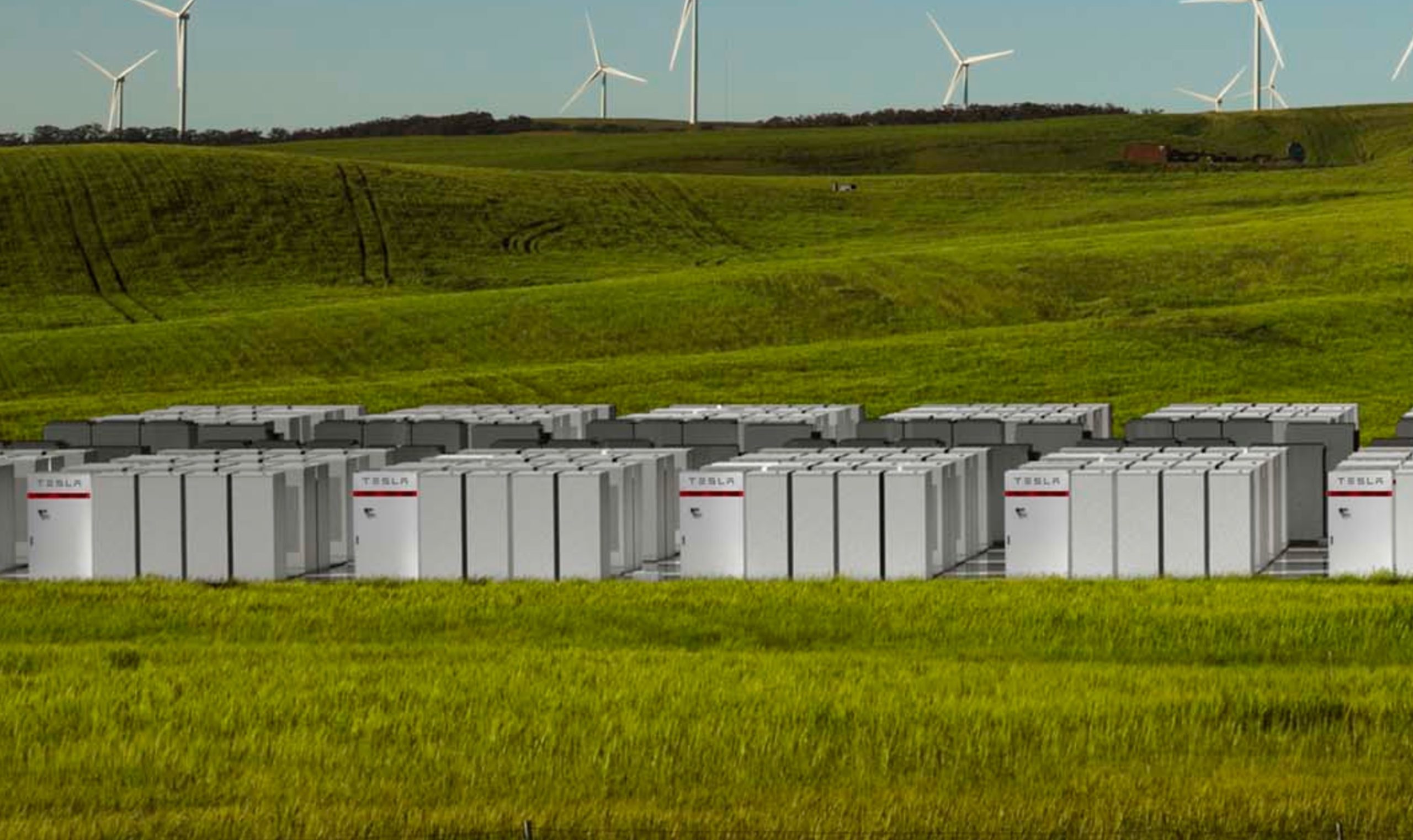
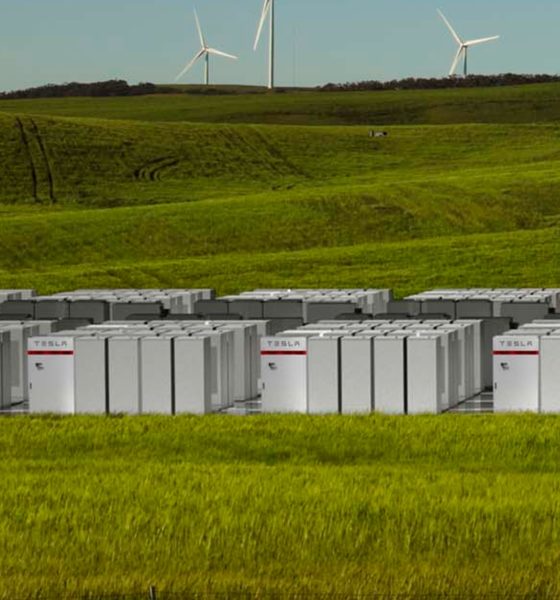
Energy
Tesla scores deal to fix South Australia’s power crisis with 100MW battery system powered by wind farm
Tesla has secured a contract to install the world’s largest lithium-ion battery storage system in South Australia. Premier Jay Weatherill has announced an agreement between the State Government and California-based Tesla to install a 100-megawatt (129 megawatt hour) Powerpack system to be paired with a wind farm by global renewable energy provider Neoen’s Hornsdale.
The battery system will operate continuously and charge using renewable energy from the wind farm, and ultimately serve as back-up power in the event of energy instability from local utilities. “Tesla Powerpack will charge using renewable energy from the Hornsdale Wind Farm and then deliver electricity during peak hours to help maintain the reliable operation of South Australia’s electrical infrastructure.” reads the press release by Tesla.
The deal between Tesla and the South Australia first came to light in March when Tesla CEO Elon Musk committed to solving South Australia’s power crisis in 100 days through a Tesla Energy product or the system will be free.
legend! ☀️ You’re on mate. Give me 7 days to try sort out politics & funding. DM me a quote for approx 100MW cost – mates rates!
— Mike Cannon-Brookes 👨🏼💻🧢🇦🇺 (@mcannonbrookes) March 10, 2017
The 100MW system will be made up of approximately 640 Tesla Powerpacks (129MWh) or roughly the amount of batteries used in 1,300 Tesla Model S (or Model X) P100Ds.
In speaking about the latest deal with Tesla, South Australian premier Jay Weatherill said, “South Australia has been leading the nation in renewable energy – now we are leading the world in battery storage. I’m thrilled with the selection of Neoen and Tesla, whose experience and world-leadership in energy security and renewables will help South Australia take charge of its own energy future. Battery storage is the future of our national energy market, and the eyes of the world will be following our leadership in this space. This historic agreement does more than bring a global energy giant in Tesla to South Australia, it will also have some significant economic spin-offs.”
Watch as Weatherhill speaks LIVE in Adelaide with Elon Musk, talking about building the world’s biggest lithium ion battery in South Australia.
Tesla confirmed that the project will be finalized by December 2017. When complete, the sustainable energy system will provide enough power for more than 30,000 homes, and serve as a grid-scale energy storage system for blackout prevention.
We’ve provided the full statement by Tesla, as follows:
Tesla Powerpack to Enable Large Scale Sustainable Energy to South Australia
Last September, a 50-year storm damaged critical infrastructure in the state of South Australia, causing a state-wide blackout and leaving 1.7 million residents without electricity. Further blackouts occurred in the heat of the Australian summer in early 2017. In response, the South Australian Government as a leader in renewable energy, looked for a sustainable solution to ensure energy security for all residents, now and into the future, calling for expressions of interest to deploy grid-scale energy storage options with at least 100 megawatts (MW) of capacity.
This week, through a competitive bidding process, Tesla was selected to provide a 100 MW/129 MWh Powerpack system to be paired with global renewable energy provider Neoen’s Hornsdale Wind Farm near Jamestown, South Australia. Tesla was awarded the entire energy storage system component of the project.
Tesla Powerpack will charge using renewable energy from the Hornsdale Wind Farm and then deliver electricity during peak hours to help maintain the reliable operation of South Australia’s electrical infrastructure. The Tesla Powerpack system will further transform the state’s movement towards renewable energy and see an advancement of a resilient and modern grid.
Upon completion by December 2017, this system will be the largest lithium-ion battery storage project in the world and will provide enough power for more than 30,000 homes, approximately equal to the amount of homes that lost power during the blackout period.
Working in close collaboration with the South Australian Government and Neoen, this grid scale energy storage project is not only sustainable, but will help solve power shortages, reduce intermittencies, and manage summertime peak load to improve the reliability of South Australia’s electrical infrastructure. In addition, Tesla’s Powerwall is now being installed for residential customers across Australia and ramping up quickly. The same technology that can help stabilize the South Australian grid can also be used by homeowners to collect energy during the day so it is stored and made available day and night, providing uninterrupted power even if the grid goes down.
Tesla is proud to be part of South Australia’s renewable energy future, and we expect this project will provide a model for future deployments around the world that will help significantly accelerate the adoption of sustainable energy.

Energy
Tesla launches Cybertruck vehicle-to-grid program in Texas
The initiative was announced by the official Tesla Energy account on social media platform X.
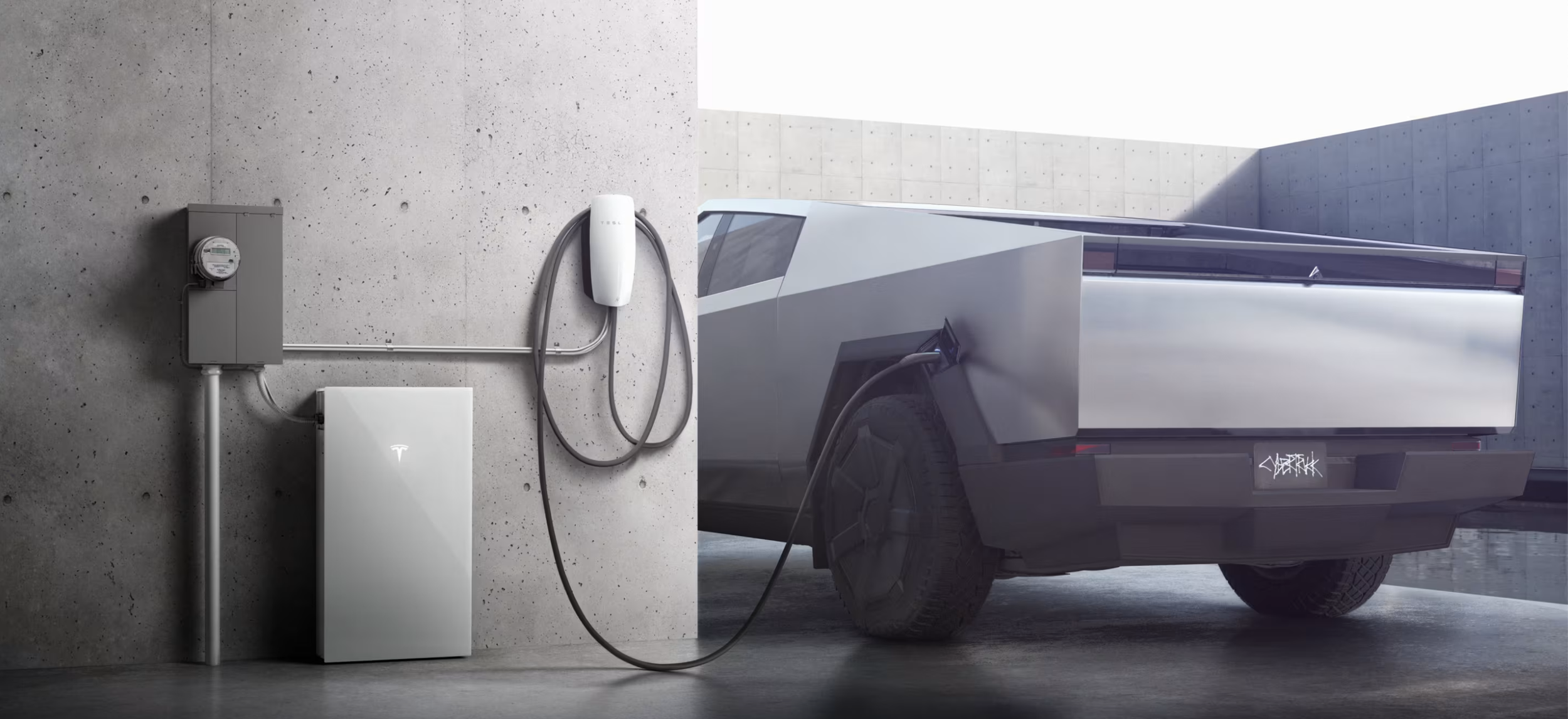
Tesla has launched a vehicle-to-grid (V2G) program in Texas, allowing eligible Cybertruck owners to send energy back to the grid during high-demand events and receive compensation on their utility bills.
The initiative, dubbed Powershare Grid Support, was announced by the official Tesla Energy account on social media platform X.
Texas’ Cybertruck V2G program
In its post on X, Tesla Energy confirmed that vehicle-to-grid functionality is “coming soon,” starting with select Texas markets. Under the new Powershare Grid Support program, owners of the Cybertruck equipped with Powershare home backup hardware can opt in through the Tesla app and participate in short-notice grid stress events.
During these events, the Cybertruck automatically discharges excess energy back to the grid, supporting local utilities such as CenterPoint Energy and Oncor. In return, participants receive compensation in the form of bill credits. Tesla noted that the program is currently invitation-only as part of an early adopter rollout.
The launch builds on the Cybertruck’s existing Powershare capability, which allows the vehicle to provide up to 11.5 kW of power for home backup. Tesla added that the program is expected to expand to California next, with eligibility tied to utilities such as PG&E, SCE, and SDG&E.
Powershare Grid Support
To participate in Texas, Cybertruck owners must live in areas served by CenterPoint Energy or Oncor, have Powershare equipment installed, enroll in the Tesla Electric Drive plan, and opt in through the Tesla app. Once enrolled, vehicles would be able to contribute power during high-demand events, helping stabilize the grid.
Tesla noted that events may occur with little notice, so participants are encouraged to keep their Cybertrucks plugged in when at home and to manage their discharge limits based on personal needs. Compensation varies depending on the electricity plan, similar to how Powerwall owners in some regions have earned substantial credits by participating in Virtual Power Plant (VPP) programs.
Cybertruck
Tesla updates Cybertruck owners about key Powershare feature
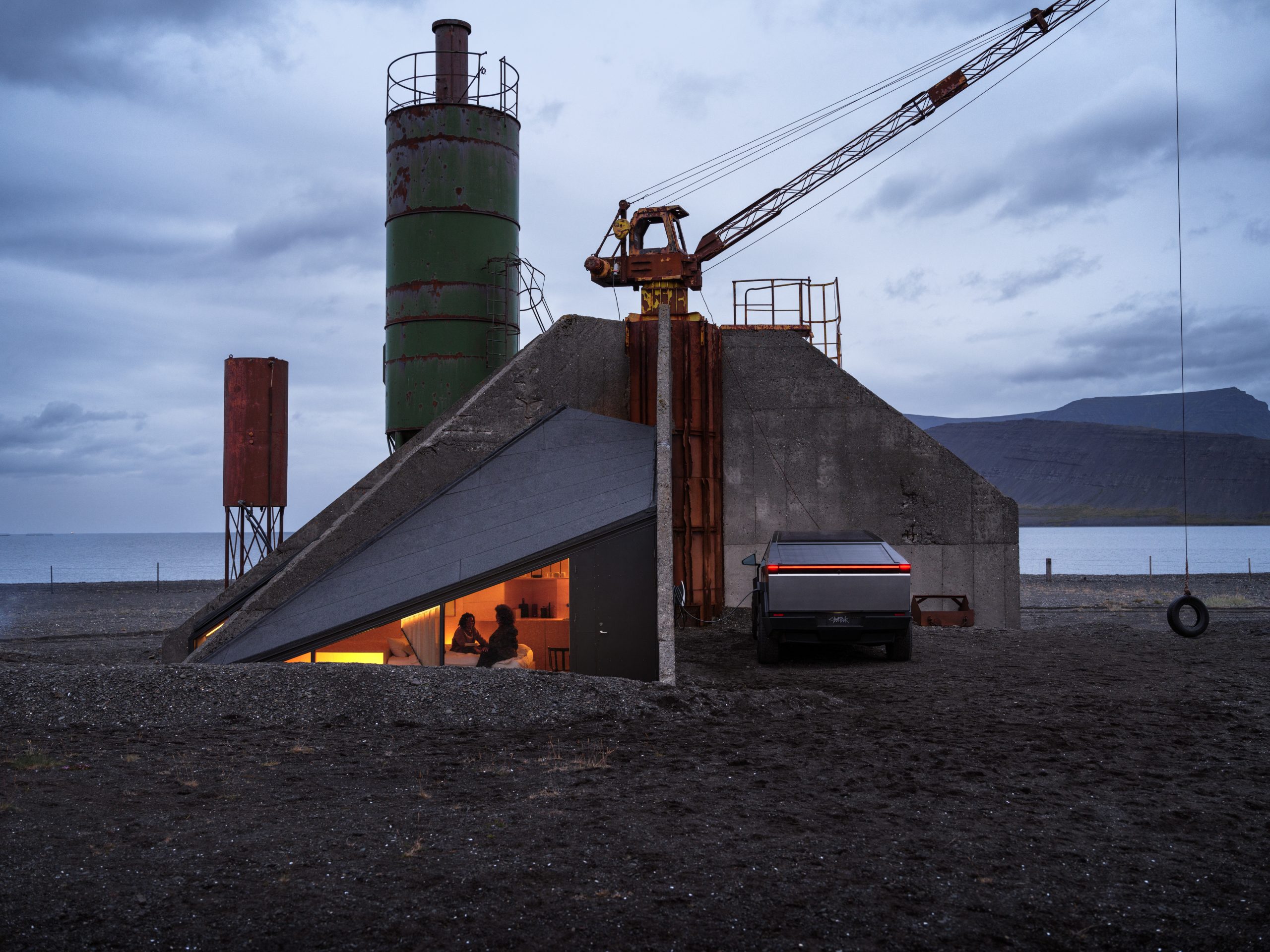
Tesla is updating Cybertruck owners on its timeline of a massive feature that has yet to ship: Powershare with Powerwall.
Powershare is a bidirectional charging feature exclusive to Cybertruck, which allows the vehicle’s battery to act as a portable power source for homes, appliances, tools, other EVs, and more. It was announced in late 2023 as part of Tesla’s push into vehicle-to-everything energy sharing, and acting as a giant portable charger is the main advantage, as it can provide backup power during outages.
Cybertruck’s Powershare system supports both vehicle-to-load (V2L) and vehicle-to-home (V2H), making it flexible and well-rounded for a variety of applications.
However, even though the feature was promised with Cybertruck, it has yet to be shipped to vehicles. Tesla communicated with owners through email recently regarding Powershare with Powerwall, which essentially has the pickup act as an extended battery.
Powerwall discharge would be prioritized before tapping into the truck’s larger pack.
However, Tesla is still working on getting the feature out to owners, an email said:
“We’re writing to let you know that the Powershare with Powerwall feature is still in development and is now scheduled for release in mid-2026.
This new release date gives us additional time to design and test this feature, ensuring its ability to communicate and optimize energy sharing between your vehicle and many configurations and generations of Powerwall. We are also using this time to develop additional Powershare features that will help us continue to accelerate the world’s transition to sustainable energy.”
Owners have expressed some real disappointment in Tesla’s continuous delays in releasing the feature, as it was expected to be released by late 2024, but now has been pushed back several times to mid-2026, according to the email.
Foundation Series Cybertruck buyers paid extra, expecting the feature to be rolled out with their vehicle upon pickup.
Cybertruck’s Lead Engineer, Wes Morrill, even commented on the holdup:
As a Cybertruck owner who also has Powerwall, I empathize with the disappointed comments.
To their credit, the team has delivered powershare functionality to Cybertruck customers who otherwise have no backup with development of the powershare gateway. As well as those with solar…
— Wes (@wmorrill3) December 12, 2025
He said that “it turned out to be much harder than anticipated to make powershare work seamlessly with existing Powerwalls through existing wall connectors. Two grid-forming devices need to negotiate who will form and who will follow, depending on the state of charge of each, and they need to do this without a network and through multiple generations of hardware, and test and validate this process through rigorous certifications to ensure grid safety.”
It’s nice to see the transparency, but it is justified for some Cybertruck owners to feel like they’ve been bait-and-switched.
Energy
Tesla starts hiring efforts for Texas Megafactory
Tesla’s Brookshire site is expected to produce 10,000 Megapacks annually, equal to 40 gigawatt hours of energy storage.
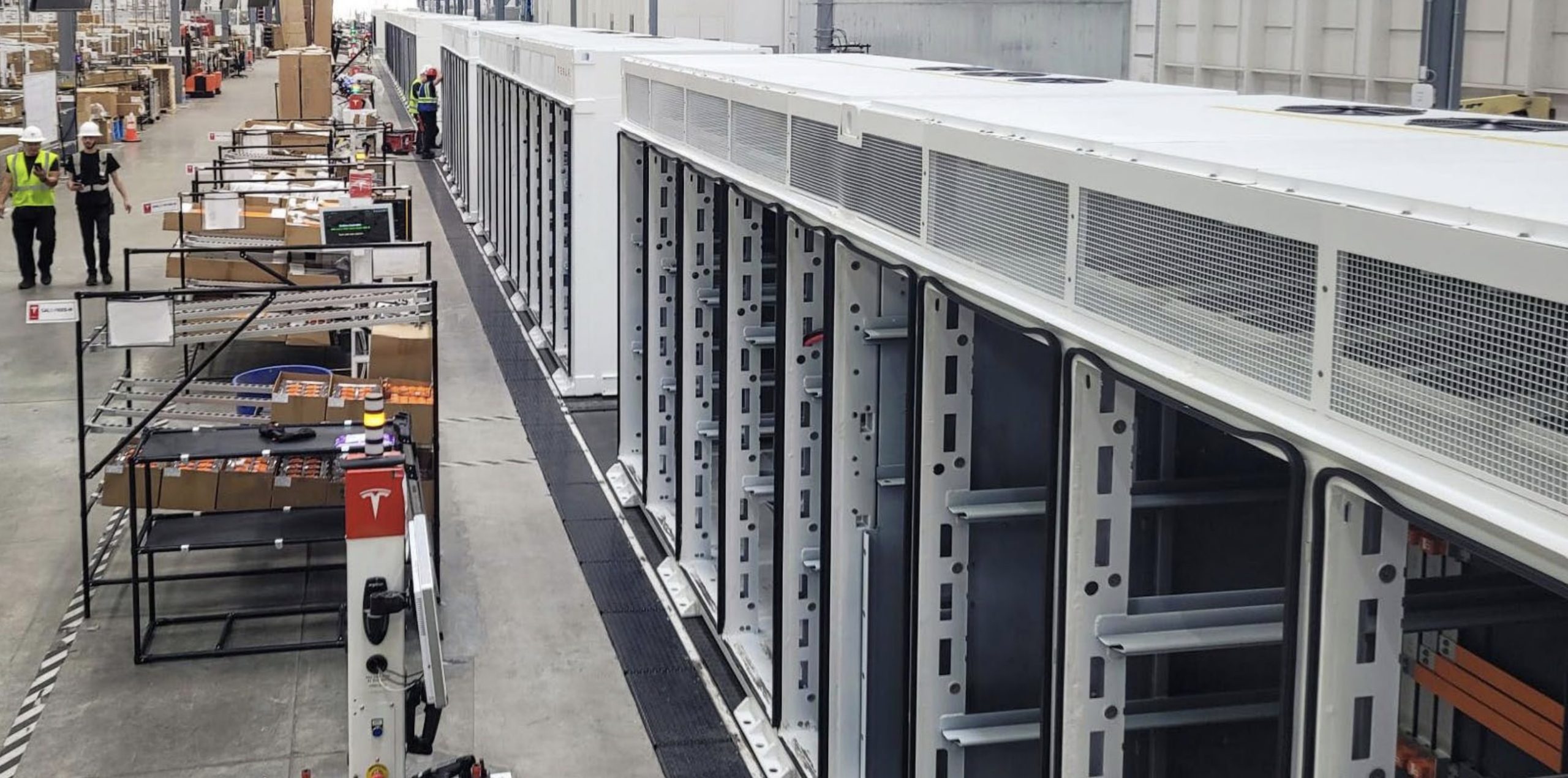
Tesla has officially begun hiring for its new $200 million Megafactory in Brookshire, Texas, a manufacturing hub expected to employ 1,500 people by 2028. The facility, which will build Tesla’s grid-scale Megapack batteries, is part of the company’s growing energy storage footprint.
Tesla’s hiring efforts for the Texas Megafactory are hinted at by the job openings currently active on the company’s Careers website.
Tesla’s Texas Megafactory
Tesla’s Brookshire site is expected to produce 10,000 Megapacks annually, equal to 40 gigawatt hours of energy storage, similar to the Lathrop Megafactory in California. Tesla’s Careers website currently lists over 30 job openings for the site, from engineers, welders, and project managers. Each of the openings is listed for Brookshire, Texas.
The company has leased two buildings in Empire West Business Park, with over $194 million in combined property and equipment investment. Tesla’s agreement with Waller County includes a 60% property tax abatement, contingent on meeting employment benchmarks: 375 jobs by 2026, 750 by 2027, and 1,500 by 2028, as noted in a report from the Houston Business Journal. Tesla is required to employ at least 1,500 workers in the facility through the rest of the 10-year abatement period.
Tesla’s clean energy boom
City officials have stated that Tesla’s arrival marks a turning point for the Texas city, as it highlights a shift from logistics to advanced clean energy manufacturing. Ramiro Bautista from Brookshire’s economic development office, highlighted this in a comment to the Journal.
“(Tesla) has great-paying jobs. Not just that, but the advanced manufacturing (and) clean energy is coming to the area,” he said. “So it’s not just your normal logistics manufacturing. This is advanced manufacturing coming to this area, and this brings a different type of job and investment into the local economy.”








